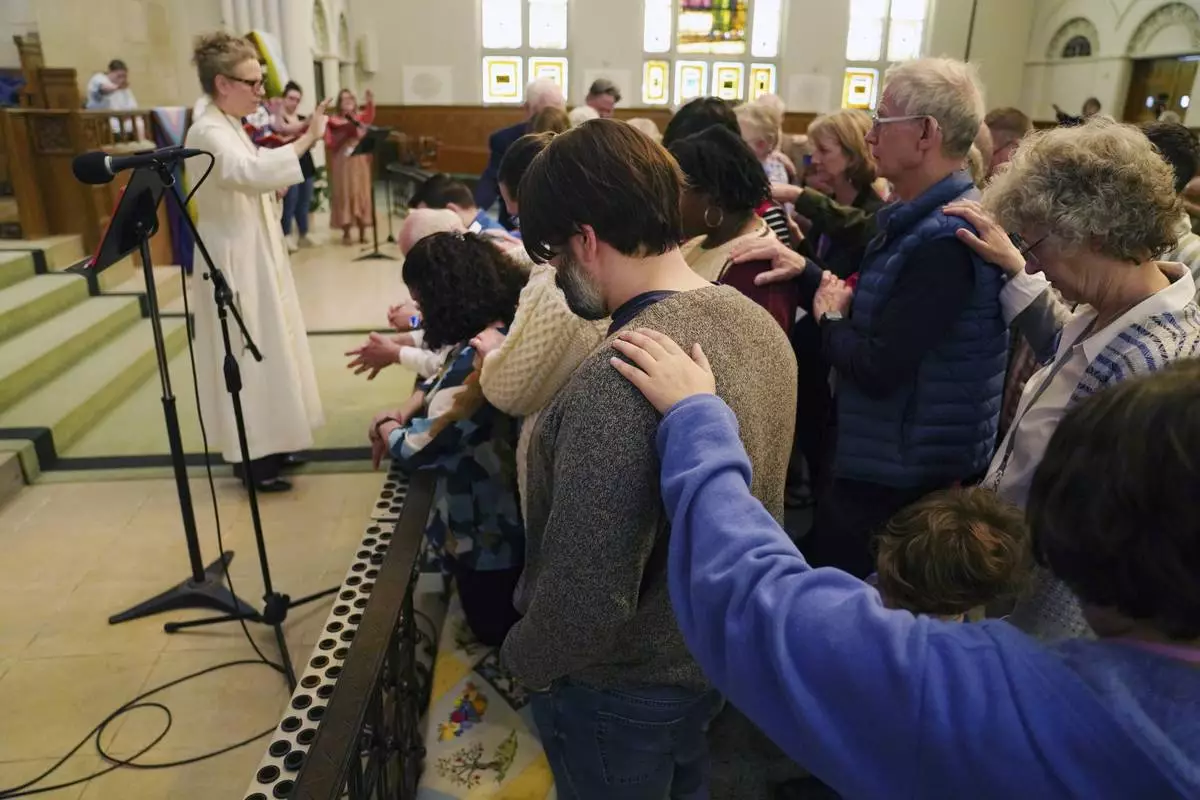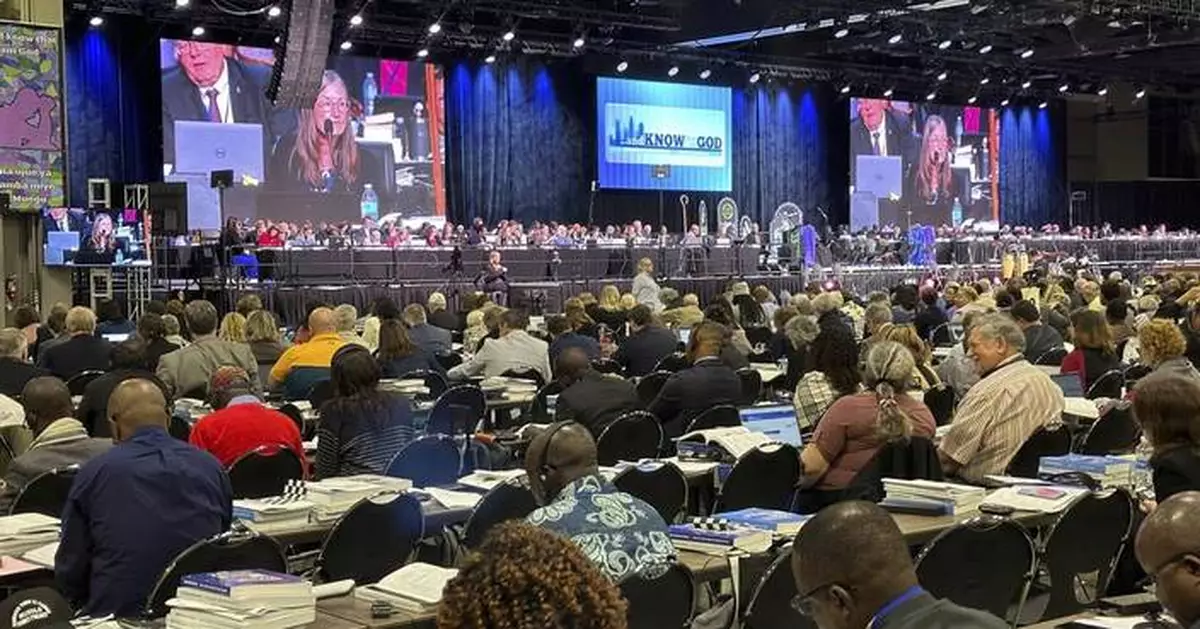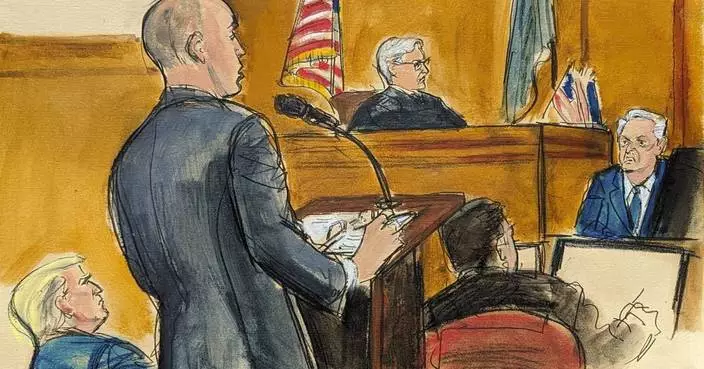CHARLOTTE, N.C. (AP) — United Methodist delegates began making historic changes in their policies on sexuality on Tuesday — voting without debate to reverse a series of anti-LGBTQ policies.
The delegates voted to delete mandatory penalties for conducting same-sex marriages and to remove their denomination's bans on considering LGBTQ candidates for ministry and on funding for gay-friendly ministries.
The 667-54 vote, coming during their legislative General Conference, removes some of the scaffolding around the United Methodist Church's longstanding bans on LGBTQ-affirming policies regarding ordination, marriage and funding.
Still to come later this week are votes on the core of the bans on LGBTQ clergy and same-sex marriage in church law and policy, which may draw more debate. However, the large majority achieved by Tuesday's votes indicate the tenor of the General Conference. The consensus was so overwhelming that these items were rolled into the legislative “consent calendar," normally reserved for non-controversial measures.
The actions follow a historic schism in what was long the third-largest denomination in the United States. About one-quarter of U.S. congregations left between 2019 and 2023, mostly conservative churches dismayed that the denomination wasn't enforcing its longstanding LGBTQ bans. With the absence of many conservative delegates, who had been in the solid majority in previous general conferences and had steadily reinforced such bans over the decades, progressive delegates are moving quickly to reverse such policies.
Such actions could also prompt departures of some international churches, particularly in Africa, where more conservative sexual values prevail and where same-sex activity is criminalized in some countries.
United Methodist Church law still bans the ordination of “self-avowed practicing homosexuals” into ministry — a decades-old rule that will come up for a vote later this week.
However, on Tuesday, the General Conference voted to remove a related ban — on church officials considering someone for ordination who fits that category. It removed bans on bishops ordaining LGBTQ people as clergy or consecrating them as bishops.
It also removed mandatory penalties — imposed by a 2019 General Conference — on clergy who conduct ceremonies celebrating same-sex weddings or unions.
And it imposed a moratorium on any church judicial processes seeking to discipline any clergy for violating LGBTQ-related rules.
In addition, the General Conference took actions toward being openly LGBTQ-affirming.
It repealed a longstanding ban on any United Methodist entity using funds “to promote the acceptance of homosexuality.” That previous ban also forbade the funding of any effort to "reject or condemn lesbian and gay members and friends" and expressly supported the funding of responses to the anti-HIV epidemic. However, the mixed wording of the old rule has been replaced with a ban on funding any effort to “reject any LGBTQIA+ person or openly discriminate against LGBTQIA+ people.”
“It’s a very liberating day for United Methodists who are actively involved with LGBTQ people,” said the Rev. David Meredith, board chair for the Reconciling Ministries Network, a group that has long advocated for LGBTQ inclusion in the church.
Compared with past, contentious general conferences, this one is "much more upbeat," added Jan Lawrence, executive director of the network. “Yes, we’re going to have things we disagree on. But the vitriol that we saw in 2019, that is not evident at all.”
Other rule changes called for considering of LGBTQ people along with other demographic categories for appointments in an effort to have diversity on various church boards and entities.
The General Conference is the UMC’s first legislative gathering since 2019, one that features its most progressive slate of delegates in recent memory following the departure of more than 7,600 mostly conservative congregations in the United States because it essentially stopped enforcing its bans on same-sex marriage and LGBTQ ordination.
Those departures came during a window between 2019 and 2023 allowing U.S. congregations to leave with their properties, held in trust for the denomination, under friendlier than normal terms. Conservatives are advocating that such terms be extended for international and U.S. churches that don't agree with the General Conference's actions.
“We get it, the United Methodist Church wants to be done with disaffiliation," said the Rev. Rob Renfroe, president of the conservative advocacy group Good News. “They want to step into this new day. We do not want to keep them from that. But how can disaffiliation be over when it never began for the majority of United Methodists?”
Still to come this week are final votes on whether to remove the bans on LGBTQ clergy and same-sex marriage, and whether to whether to replace a longstanding document that had called the “practice of homosexuality … incompatible with Christian teaching.”
All of those proposals had overwhelming support in committee votes last week.
The changes would be historic in a denomination that has debated LGBTQ issues for more than half a century at its General Conferences, which typically meet every four years.
Last week, the conference endorsed a regionalization plan that essentially would allow the churches of the United States the same autonomy as other regions of the global church. That change – which still requires local ratification -- could create a scenario where LGBTQ clergy and same-sex marriage are allowed in the United States but not in other regions. Delegates on Tuesday approved a related measure related to regionalization.
The conference last week also approved the departure of a small group of conservative churches in the former Soviet Union.
The denomination had until recently been the third largest in the United States, present in almost every county. But its 5.4 million U.S. membership in 2022 is expected to drop once the 2023 departures are factored in.
The denomination also counts 4.6 million members in other countries, mainly in Africa, though earlier estimates have been higher.
Associated Press religion coverage receives support through the AP’s collaboration with The Conversation US, with funding from Lilly Endowment Inc. The AP is solely responsible for this content.

United Methodist delegates listen to a debate during their General Conference meeting Tuesday, April 30, 2024, in Charlotte, N.C. (AP Photo/Peter Smith)

Michigan Bishop David Bard presides at a session of the General Conference of the United Methodist Church on Tuesday, April 30, 2024, in Charlotte, N.C. (AP Photo/Peter Smith)

The Rev. Tracy Cox of First United Methodist Church, left, and members of her congregation pray for Tracy Merrick, a delegate representing Western Pennsylvania at the United Methodist General Conference, as well as The Rev. Anais Hussian and Joshua Popson, Sunday, April 14, 2024, in Pittsburgh. Hussian is a reserve delegate at the General Conference and Popson is advocating for LGBTQ inclusion with the Love Your Neighbor Coalition. The 11-day conference is the denomination's first legislative gathering since a special session in 2019. (AP Photo/Jessie Wardarski)

Corrects Photographer ID: Bishop Sandra Steiner Ball presides at a session of the General Conference of the United Methodist Church on Monday, April 29, in Charlotte, N.C. (AP Photo/Peter Smith)
The world's top-selling pizza chain is betting big on the generosity of its customers. And it is not alone.
Domino's recently pledged $174 million over the next ten years to benefit St. Jude Children’s Research Hospital, expecting the funds to come from its longstanding roundup campaign that invites customers to donate the difference between their purchase total and the next-highest dollar amount. The pizza chain has already raised more than $126 million this way across the past two decades for ALSAC, the fundraising organization for the Tennessee-based hospital.
Domino's is the latest and largest example of “checkout charity” success. The fundraising tool raked in 24% more money in 2022 than 2020 among the highest making programs, for a total of $749 million, according to the professional association Engage for Good.
That staying power has franchises hopeful that consumers will continue giving their spare change despite shifts toward online shopping, negative economic headwinds and fears that more frequent solicitations will cause fatigue. Meanwhile, some retailers are fleshing out partnerships first formed after the 2020 racial reckoning pushed corporate citizenship toward the forefront of business practices.
Studies suggest that asking customers to round up is generally more effective than requesting a fixed amount — even when the totals are the same. That's because the framing lessens the sting of parting with one's money, according to a paper published in the Journal of Consumer Psychology.
“It feels less painful," said Katie Kelting, a Saint Louis University marketing professor who led the research team.
The timing of the appeal introduces several other psychologically potent factors, according to Ike Silver, a marketing professor at Northwestern University. Buyers tend to imagine their purchases in whole numbers anyway; a $24.75 bill codes as $25, for example.
Plus, Silver said, it makes the act of giving “a bit more mindless.” Shoppers rushing to get through the checkout line don't have much time to consider reasons against the donation.
“They capitalize on a purchase inertia where you're just spending your money and you're not really thinking too much about it,” Silver said.
Champions of the strategy credit the asks for engaging everyday, would-be donors in an approachable form of giving with low barriers to entry. The practice is so commonplace that shoppers' cumulative gifts have even become a key funding stream for some issue areas.
PetSmart Charities, which reports that over 80% of its cash donations come through the PIN pad at checkout, is considered the largest grantmaker for animal welfare causes. The pet superstore, which has been running its continual PIN pad donation program for 20 years, asks customers to give a fixed dollar amount starting at $2.
The money supports causes directly related to pets, such as increased access to veterinary care and animal evacuation services during natural disasters. That authentic connection is one reason that PetSmart Charities President Aimee Gilbreath believes their average donation is just under $3 — which is projected to add up to $40 million by the end of this year.
Without the closely aligned missions, Gilbreath expects they'd have a slightly harder time getting customers to donate.
“It’s just much easier for people to say yes when they get, ‘I’m here shopping at PetSmart. I love pets. If I donate to PetSmart Charities, I’m going to support pets who need a family, I’m going to support pets in other ways’," she said.
Indeed, Kelting said the fit between the charity and the seller is “huge.” Customers can perceive point-of-sale solicitations as a violation of their social contract with a company, according to researchers, but partnerships among likeminded organizations are viewed in a more positive light.
REI Co-op, a specialty outdoor clothing and equipment seller, launched its member-supported public charity in 2021 to help make outdoor spaces more inclusive. The goal was to put more resources into the surrounding communities coming out of COVID-19 shutdowns.
At its 185 U.S. locations, sales associates often strike up personal conversations about buyers' upcoming excursions. Those unique connections with its clientele of nature enthusiasts open the door for donation requests at checkout, according to Squire Simpson, a board member at the REI Cooperative Action Fund.
REI cashiers are supposed to leave the conversation with an open-ended ask that lets customers decide whether to round up or donate an amount of their choosing. About $2.2 million from 1.3 million individual donations were raised in stores last year, according to Simpson, a 2.5% increase over 2022.
Grantees include a Pennsylvania group that promotes biking among Black women and an Alaska nonprofit that provides therapeutic recreation for people with disabilities.
“It’s not some broad, corporate recipient,” Simpson said.
Still, some observers are worried that even the best of intentions won't keep the spigot from stopping as likeminded programs pop up in checkout lines around the country. Silver, the Northwestern University professor, questions whether the effectiveness of “checkout charity” will wane with its popularity.
“If it’s really something that’s coming up every time you swipe your card, one risk is people start to notice that and feel a bit more manipulated," he said.
Misinformation does not help either. Contrary to popular internet memes, tax policy experts say that stores can’t write off customers' point-of-sale donations because they don’t count as company income.
Domino's leaders remain confident in their fine-tuned strategy. With the iconic St. Jude child printed on Domino’s pizza boxes, the established partners are already among the most recognizable when it comes to point-of-sale donations.
Above the checkout widget is a roundup request with that image of the child. During its 11-week, end-of-the-year campaign, customers are greeted by a “click and go” pop-up soliciting $2, $5, $10 or $20. The request details St. Jude's work and features an overall donation tracker.
Domino's raised $8.9 million last year through roundup. Its leadership believes that number will increase under a new five-year strategy to grow its customer base.
Described by CEO Russell Weiner as “an audacious goal” that isn’t necessarily a “slam dunk,” the high-dollar charitable commitment adds another motivator to meet its latest nonprofit benchmarks.
ALSAC CEO Rick Shadyac said the extra Domino’s funding will help St. Jude's efforts in 80 countries to help ttriple the survival rate for children with the six most common forms of childhood cancer. That includes this summer's rollout of a program that will eventually provide free cancer medications to 30% of the 400,000 children around the world with the disease.
“If we drive more sales and more stores, what does that mean? That means we have more customers,” Weiner told The Associated Press. “The better we do there, the more people we’ve got that we can raise money for St. Jude.”
Associated Press coverage of philanthropy and nonprofits receives support through the AP’s collaboration with The Conversation US, with funding from Lilly Endowment Inc. The AP is solely responsible for this content. For all of AP’s philanthropy coverage, visit https://apnews.com/hub/philanthropy.

An option to donate to St. Jude Children's Research Hospital appears on the Domino's app in a photo taken in New York on Wednesday, May 15, 2024. Domino's is the latest and largest example of philanthropic allies new and old finding success through "checkout charity." (AP Photo/Peter Morgan)














